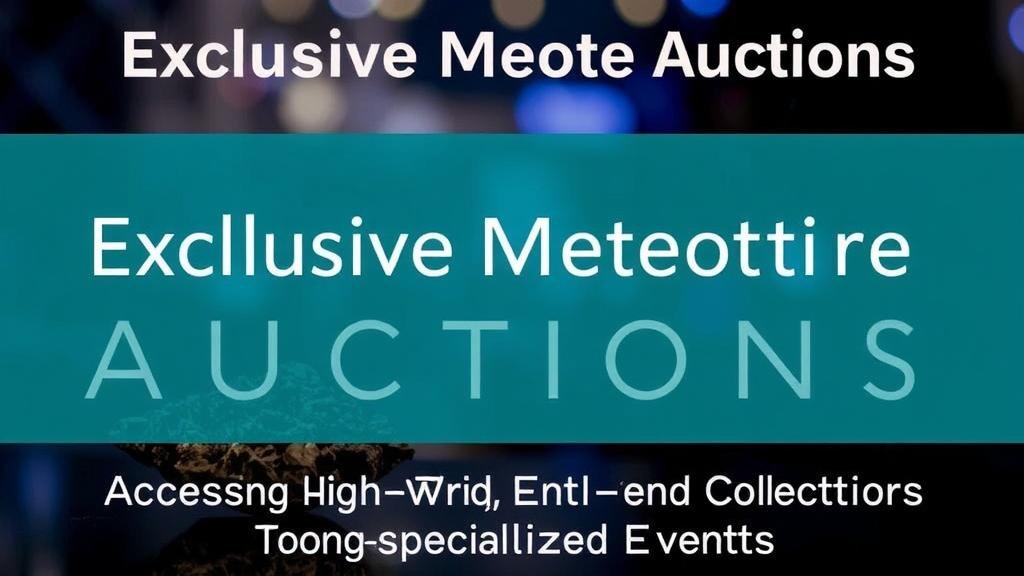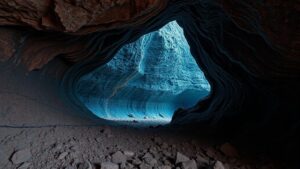Exclusive Meteorite Auctions: Accessing High-End Collectors Through Specialized Events
Exclusive Meteorite Auctions: Accessing High-End Collectors Through Specialized Events
The world of meteorite collecting has evolved significantly in recent years, attracting a dedicated community of rockhounds and mineral collectors alike. Exclusive meteorite auctions provide an unparalleled opportunity for enthusiasts to acquire rare specimens while engaging with other passionate collectors. This article delves into the significance of these auctions, the types of meteorites available, and practical tips for collectors seeking to navigate this niche market.
The Appeal of Meteorite Collecting
Meteorites, the remnants of space rocks that have survived their fiery transit through Earths atmosphere, captivate collectors due to their scientific and aesthetic value. e celestial fragments often contain unique minerals and can provide insights into the formation of our solar system. According to estimates from the Meteoritical Society, over 61,000 distinct meteorite specimens have been identified, with new ones continually being discovered, adding to their allure.
The Role of Exclusive Auctions
Exclusive meteorite auctions serve as a pivotal point for collectors to access high-quality specimens that are often unavailable in typical retail settings. These auctions feature specimens that range from the more common chondrites to rare finds like lunar or Martian meteorites, the latter of which can command prices upward of $1,000 per gram. leading auction houses, such as Sotheby’s and Christie’s, regularly host events where unique meteorite offerings are placed in front of a global audience of bidders.
- Accessibility to Rare Specimens: Auctions often house pieces that are not readily available on the market, especially for experienced collectors looking for investments or scientifically significant specimens.
- Global Competition: By auctioning meteorites, collectors can gauge the global interest and pricing of certain specimens, as bids from international collectors can drive up the final sale price.
- Expert Appraisal: Reputable auction houses conduct thorough appraisals and provide provenance information, ensuring the legitimacy of each meteorite.
Types of Meteorites Frequently Auctioned
For potential buyers, understanding the categories of meteorites is essential. Here are the main classifications commonly found in auctions:
- Chondrites: The most abundant meteorites, composed of small spherical grains known as chondrules. Examples include Allende and Murchison.
- Achondrites: These stony meteorites do not contain chondrules and represent a more diverse set of planetary materials, including Martian meteorites like Tissint.
- Iron Meteorites: These consist primarily of metallic iron and nickel, often with beautiful crystalline structures and patterns. Gibeon meteorite from Namibia is a well-known example.
- Stony-Iron Meteorites: Composed of equal parts metal and stone, these are relatively rare and can include notable specimens like the Sikhote-Alin meteorite.
How to Prepare for a Meteorite Auction
Before diving into the bidding process, collectors should consider several critical steps to ensure a successful acquisition:
- Research: Familiarize yourself with different meteorite types, their characteristics, and market values. Websites like The Meteoritical Society and auction house archives provide valuable insights.
- Set a Budget: Determine your price range ahead of time, factoring in the hammer price and any additional fees, such as buyers premiums, which can range from 5% to 20%.
- Inspect Specimens: If possible, attend the auction preview to physically examine specimens, as photos may not always capture important details like weight and condition.
- Understand Bidding Strategies: Decide whether you will be a front-runner in bidding or adopt a conservative approach. Study previous auction outcomes to anticipate bidding behavior.
Real-World Applications and the Future of Meteorite Collecting
Exclusive meteorite auctions not only serve collectors but also play a vital role in advancing scientific research. Meteorites can yield valuable data regarding past planetary conditions, offering insights that enhance our understanding of Earth and the broader solar system. As space exploration intensifies, including missions to asteroids and potential manned missions to Mars, the market for meteorites is likely to grow, driven by both scientific advancements and collecting enthusiasm.
Conclusion
Exclusive meteorite auctions represent a unique intersection of commerce, science, and education, appealing to collectors who wish to expand their collections with rare and significant specimens. By leveraging dedicated research, setting clear budgets, and mastering bidding techniques, rockhounds can successfully navigate this specialized market. With each meteorite auction, collectors not only build their own collections but also contribute to the broader appreciation of these incredible artifacts from space.



